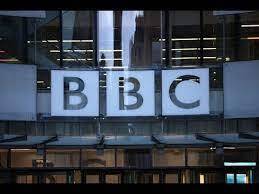
The BBC is now facing one of the most serious crises in its modern history after revelations that a documentary aired by the broadcaster contained an edited version of President Donald Trump’s January 6 speech. The edit, which critics say removed key language in which Trump urged his supporters to demonstrate “peacefully,” has triggered a wave of outrage in both the United States and the United Kingdom. What began as a controversy over editorial judgment has escalated into a full-blown scandal, with President Trump threatening legal action that could seek damages in the billions of dollars, and two of the BBC’s most senior executives resigning under pressure.
The documentary in question, Trump: A Second Chance?, aired in October 2024 as part of the BBC’s Panorama series. In its coverage of the January 6 Capitol riot, the program included a version of Trump’s speech that critics argue was misleadingly edited. By splicing together separate sections of the address and omitting his call for peaceful protest, the broadcast appeared to suggest that Trump had incited violence without qualification. Trump’s legal team quickly seized on the issue, accusing the BBC of defamation and deliberate election interference. In a letter to the broadcaster, they demanded a retraction and apology, threatening a lawsuit that could seek between $1 billion and $5 billion in damages. Trump himself has publicly vowed to pursue the case, calling the edit “egregious” and framing it as part of a broader campaign against him by what he describes as “fake news” outlets.
The BBC responded with an apology, acknowledging what it called an “error in judgment” in the editing process. Samir Shah, the BBC’s chair, issued a personal apology to the White House, but the corporation has rejected Trump’s demands for compensation, insisting that while the edit was regrettable, it does not meet the legal threshold for defamation. Nevertheless, the fallout has been swift and severe. On November 9, 2025, Director-General Tim Davie and Deborah Turness, the CEO of BBC News, both resigned from their posts. Their departures underscore the gravity of the scandal, as both were central figures in shaping the BBC’s editorial direction and defending its reputation for impartiality. The resignations have fueled debate about whether the broadcaster has systemic problems in its editorial oversight or whether this was a one-off mistake magnified by political pressure.
The controversy comes at a particularly sensitive time for the BBC. Its public charter is due for renewal in 2027, and questions about its credibility, impartiality, and political independence are already dominating discussions about its future. Critics argue that the incident highlights deeper issues in the BBC’s editorial culture, suggesting that political bias has undermined its mission as a publicly funded broadcaster. Defenders, however, insist that the edit was a mistake rather than a deliberate act of manipulation, and that the resignations demonstrate accountability rather than systemic failure. Still, the damage to the BBC’s reputation is undeniable. Trump’s framing of the issue as part of his broader fight against “fake news” has resonated with his supporters, and the threat of a multibillion-dollar lawsuit has added a legal dimension that could reshape the boundaries of international defamation law.
The broader implications extend beyond the BBC itself. If Trump proceeds with his lawsuit, the case could test how defamation claims are handled across borders, particularly when a publicly funded broadcaster with global reach is accused of misrepresenting a political figure. It could also strain U.S.–UK media relations, as the BBC’s role as a trusted international news source is called into question. For Trump, the controversy provides a powerful narrative tool in his ongoing battle against media institutions, reinforcing his claims of bias and manipulation. For the BBC, it represents a moment of reckoning, forcing the organization to confront questions about its editorial standards, its accountability to the public, and its ability to maintain credibility in an era of intense political polarization.
In the end, the scandal is not simply about one edited speech. It is about the trustworthiness of institutions, the power of media to shape political narratives, and the consequences of editorial decisions in a world where every misstep can become a global controversy. The resignations of Tim Davie and Deborah Turness mark a dramatic turning point, but the story is far from over. With Trump promising to pursue legal action and the BBC struggling to repair its reputation, the controversy is likely to reverberate for years to come, shaping debates about media accountability, political influence, and the fragile balance between free expression and responsible journalism.
Sources: CBS News, PBS, The Independent, NBC News, Deadline, Newsweek, The Hill, The Wrap, Tag24, Straight Arrow News
Add comment
Comments